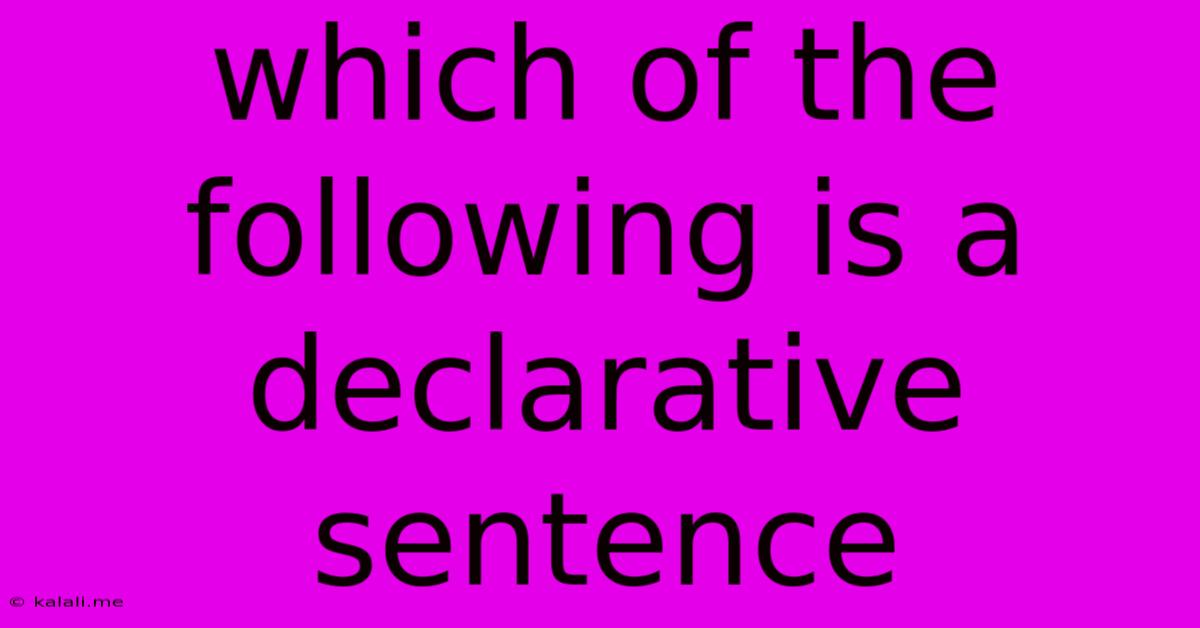Which Of The Following Is A Declarative Sentence
Kalali
Jun 14, 2025 · 3 min read

Table of Contents
Which of the Following is a Declarative Sentence? A Guide to Sentence Types
This article will explore declarative sentences, contrasting them with other sentence types and offering clear examples. Understanding declarative sentences is crucial for effective writing and communication, impacting clarity, style, and even SEO optimization. We'll delve into what makes a sentence declarative and how to easily identify them.
A declarative sentence is a type of sentence that makes a statement or expresses an opinion. It's the most common type of sentence you'll encounter in everyday writing and conversation. Unlike other sentence types, it doesn't ask a question, give a command, or express strong emotion. The key characteristic is its assertive nature: it declares something to be true or fact.
Identifying Declarative Sentences: Key Characteristics
- Statement of Fact or Opinion: A declarative sentence presents information, whether it's objectively verifiable or a subjective belief. For example, "The sky is blue" (fact) and "Chocolate cake is delicious" (opinion) are both declarative sentences.
- Ending with a Period: The most straightforward way to identify a declarative sentence is by its punctuation. Declarative sentences always end with a period (.).
- Subject-Verb Structure: While not exclusive to declarative sentences, they typically follow a subject-verb structure. The subject performs the action described by the verb. For example, in "Cats sleep a lot," "cats" is the subject and "sleep" is the verb.
Contrasting Declarative Sentences with Other Sentence Types
To fully grasp what a declarative sentence is, it's helpful to compare it to other sentence types:
- Interrogative Sentences: These sentences ask questions and end with a question mark (?). Example: "What time is it?"
- Imperative Sentences: These sentences give commands or requests and often end with a period or exclamation mark. Example: "Close the door." or "Please be quiet!"
- Exclamatory Sentences: These sentences express strong emotion and end with an exclamation mark (!). Example: "That's amazing!"
Examples of Declarative Sentences in Different Contexts
Here are a few examples showcasing the versatility of declarative sentences:
- Simple Sentence: The dog barked.
- Complex Sentence: Because it was raining, the picnic was canceled.
- Compound Sentence: The sun was shining, and the birds were singing.
- Sentence with an Object: She wrote a letter to her friend.
- Sentence with a Modifier: The fluffy, white cat slept soundly on the warm rug.
Practical Application and SEO Implications
Understanding sentence structure, including the proper use of declarative sentences, significantly improves writing clarity. For SEO purposes, clear, concise writing using predominantly declarative sentences helps search engines easily understand the content's meaning. This improves your website's ranking, as search engines prioritize well-structured, easily digestible content. Using a mix of sentence types for variation and flow is vital, but declarative sentences form the backbone of most informational content.
Conclusion
Declarative sentences are fundamental to effective writing and communication. By understanding their characteristics and contrasting them with other sentence types, you can improve your writing skills and craft content that is both engaging and easily understood by both readers and search engines. Mastering the art of writing clear and concise declarative sentences is an essential skill for any writer.
Latest Posts
Latest Posts
-
Modulus Of Elasticity Of Steel In Mpa
Jun 15, 2025
-
A Switch Is Used In A Circuit To
Jun 15, 2025
-
How To Get Sat Admission Ticket
Jun 15, 2025
-
What Is The Difference Between Perpetuity And Annuity
Jun 15, 2025
-
Select Each Of The True Statements About Dna Structure
Jun 15, 2025
Related Post
Thank you for visiting our website which covers about Which Of The Following Is A Declarative Sentence . We hope the information provided has been useful to you. Feel free to contact us if you have any questions or need further assistance. See you next time and don't miss to bookmark.